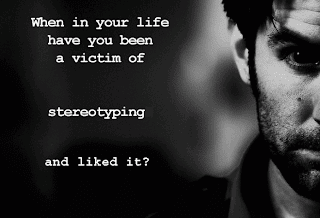This topic is sticky. It is something we all do or have done at varying levels. I am therefor not here to castigate or judge those who practice it, for I too am culpable of participation. But rather, I want to speak about the dangers of it, to perhaps pry open our eyes that too often remain somnolent and closed. I want to change attitudes and paradigms that have become jaded and caustic. As always, my hopes are ambitious if not grandiose.
There are sundry ways to define stereotyping. Some call it generalizing, some refer to it in its more specific forms i.e. racism, chauvinism, ageism, etc. and some do not even realize their ubiquitous use of it. No matter what you call it or how you view it, stereotyping people is a thought or belief about a person or group of persons that does not necessarily reflect the reality. It has been existent ever since there were groups of people on this earth. Although I doubt Adam ever mocked Eve’s driving skills or said, “It’s just typical of a girl to be beguiled by a serpent, classic Eve.”
So, why is it so dangerous to stereotype people? Before we dive into that thought, let’s ask ourselves some fundamental questions: Who do we love the most? Who do we make fun of the least, and stand up for the most? The answer is likely the people we know the very best; our family, friends that have been in our lives for years, and people that somehow make us feel special and relevant. These people are not anomalous beings that are without iniquity or weakness. They are assuredly stereotyped somewhere by some group of people. But why do we look past these putative titles or preconceived notions? Because we care about them, we love them. We do not care about their physical appearance. We do not care where they are from. We do not make libelous claims about their lives. We understand and even accept their downfalls and idiosyncratic annoyances.
So why do we do this with people we do not know? We make a debauchery of things they hold sacred, we assume the worst and we often judge a piece of literature by its flowery exterior rather than starting the first chapter. I am convinced we do this simply because we do not know the truth, and are unwilling to procure veracity. I am equally convinced that if we make a resurged effort to get to know people, our preconceived notions will dissipate. That does not mean cultural nuances will cease to exist. It just means they will not matter.
We can argue statistics, claiming that a certain group of people are clearly and inexcusably accusable of certain things. But do we know the whole story? Are we in possession of all salient facts? And if so, does that incriminate an entire nation?
As we grow older (sage 26-year old tone) we will find that stereotypes are hokum. They mean nothing, and we should not pay attention to them. What we should pay attention to are people, the individual. Getting to know people on a personal level is the best way to eradicate the poison of stereotypes.
In closing, let us not forget the litany of abuse and misfortune that has befallen the people of this planet due to stereotypes. Perhaps our prejudice and our generalization of people will not spark a heinous genocide, but what good will it bring? How will we benefit from stereotyping individuals? Maybe we think we are accepting of all people, and we radiate love 24/7. Maybe that is true, but odds are when we are at a party or social gathering we target certain pockets of people and assume things about them. Usually these assumptions prevent us from meeting them, or prevent us from taking someone seriously.
So next time you see a guy in a particularly ostentatious cravat, look past it. Next time you see a girl in clothes that are bound to rupture blood vessels due to their tightness, look past. It is rude to stare and unfair to assume you now have a clear and untainted understanding of the kind of person they are. Next time you see a foreigner, don’t assume you understand their plight, let alone their history. As difficult as it is, let’s try to reject the outer appearance and search indefatigably for the sweet jelly in the middle. Let’s forget what we have heard or thought our whole lives and give people the benefit of the dubious thought. I think in doing so we will be surprised at the increase of our own felicity and the quality of relationships formed.
"Attempting to get at truth means rejecting stereotypes and cliches." - Harold Evans


No comments:
Post a Comment